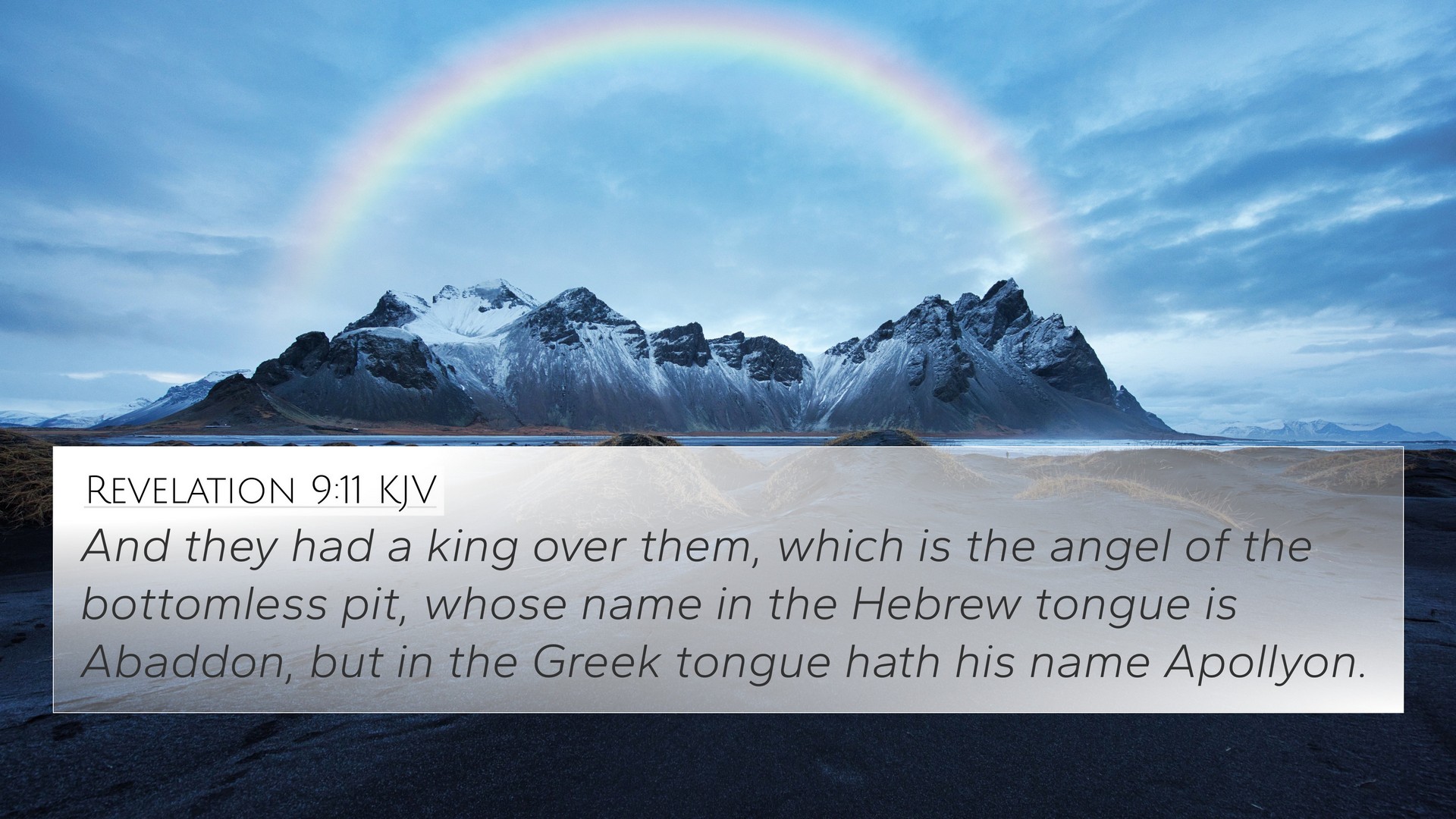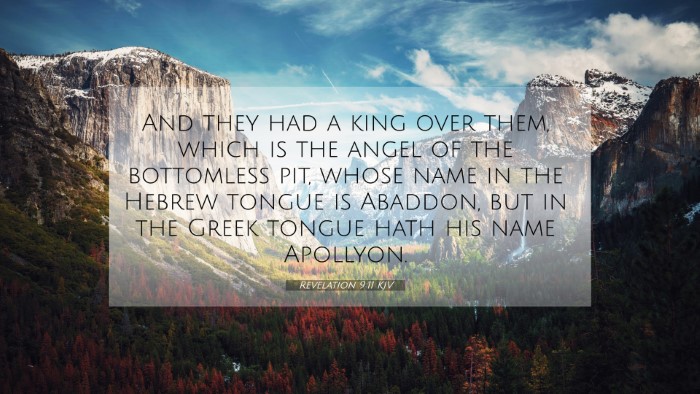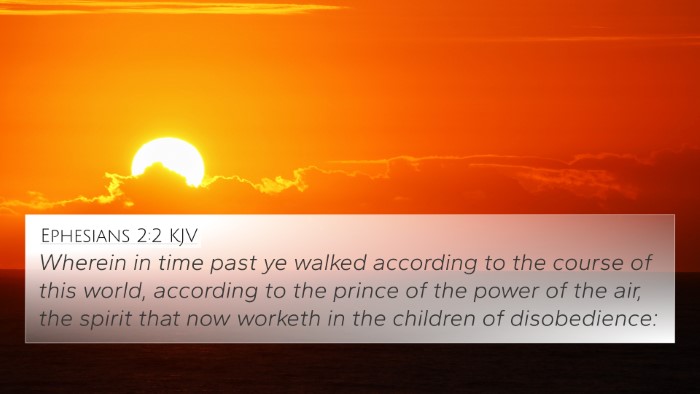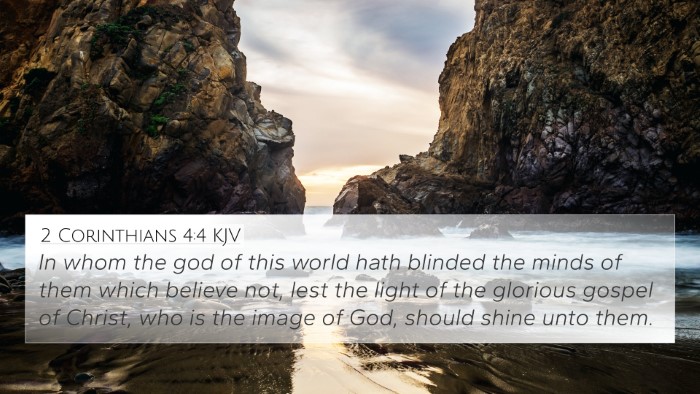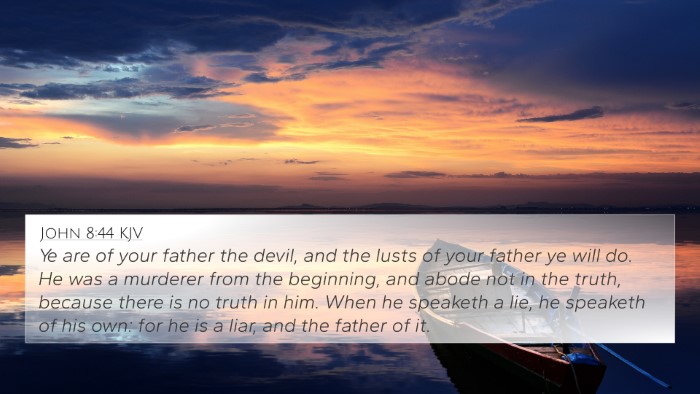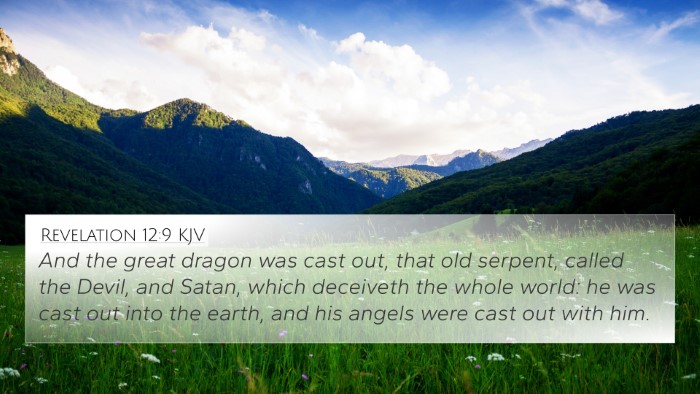Understanding Revelation 9:11
Revelation 9:11 states: "And they had a king over them, which is the angel of the bottomless pit, whose name in the Hebrew tongue is Abaddon, but in the Greek tongue hath his name Apollyon."
Summarized Meaning
This verse reveals the identity and role of a significant figure in the apocalyptic narrative—an angel representing destruction and decay. The names "Abaddon" and "Apollyon" translate to "destruction" and "destroyer," respectively, indicating the destructive nature of this entity.
Commentary Insights
-
Matthew Henry's Commentary:
Henry explains that the "king" mentioned is not merely a ruler but a formidable power that signifies ruin. By referring to this dark figure as an angel of the bottomless pit, it emphasizes the grave consequences of sin and rebellion against God. The mention of two names in Hebrew and Greek illustrates the universality of this destruction across cultures.
-
Albert Barnes' Notes:
Barnes discusses the implication of the "bottomless pit" as a realm of confinement for evil forces. He notes that the use of the terms "Abaddon" and "Apollyon" draw a parallel to both Jewish and Greek contexts, suggesting that these destructive influences are recognized in multiple traditions. The passage serves as a reminder of the spiritual battles faced by humanity.
-
Adam Clarke's Commentary:
Clarke connects this verse to the broader themes of Revelation, noting the symbolism of the king as a demonic force aligned with chaos. He emphasizes that the depiction of the angel, ruling over these locusts, signifies a release of divine judgment on the earth, highlighting God’s sovereignty even in the context of evil.
Bible Cross References
To deepen the understanding of Revelation 9:11, consider the following cross-references:
- Job 26:6 - "Hell is naked before him, and destruction hath no covering.”
- Proverbs 15:11 - "Hell and destruction are before the Lord: how much more then the hearts of the children of men?"
- Luke 8:31 - "And they besought him that he would not command them to go out into the deep." (The term 'deep' relates to the bottomless pit.)
- 2 Peter 2:4 - "For if God spared not the angels that sinned, but cast them down to hell, and delivered them into chains of darkness, to be reserved unto judgment." (Referring to fallen angels.)
- Acts 12:23 - "And immediately the angel of the Lord smote him, because he gave not God the glory: and he was eaten of worms, and gave up the ghost." (Highlighting divine judgment.)
- Revelation 11:7 - "And when they shall have finished their testimony, the beast that ascendeth out of the bottomless pit shall make war against them…" (Connections to the themes of destruction.)
- Revelation 20:1 - "And I saw an angel come down from heaven, having the key of the bottomless pit and a great chain in his hand." (Reinforcing the concept of the bottomless pit.)
Connections Between Bible Verses
The connections between Revelation 9:11 and other scriptures provide a rich understanding of the themes present in the apocalyptic vision. Each reference contributes to a comprehensive perspective on judgment, destruction, and impending doom amid divine sovereignty. By examining these links, we can appreciate the continuity and depth of biblical narratives.
Tools for Bible Cross-Referencing
To effectively study cross-references, consider these tools:
- Bible Concordance: A comprehensive index that lists words and their locations.
- Bible Cross-Reference Guide: A resource for finding thematic links.
- Bible Reference Resources: Tools that elaborate on scriptural cross-referencing.
- Bible Chain References: Systems that link verses based on themes or concepts.
Cross-Referencing Bible Study Methods
Implementing cross-referencing in Bible study aids in drawing deeper connections between verses. Utilizing systematic methods can provide a clearer understanding of how scriptures interact. Consider these approaches:
- Identifying Thematic Connections: Look for recurring motifs, such as judgment or redemption.
- Cross-Referencing Biblical Texts: Use tools to align Old Testament prophecies with New Testament fulfillments.
- Comparative Bible Verse Analysis: Address similarities in the Gospels or epistles to deepen understanding.
Conclusion
Revelation 9:11 serves as a powerful reminder of the reality of spiritual warfare and divine judgment. By cross-referencing this verse with others throughout scripture, believers can gain insight into the severity of destruction represented by Abaddon/Apollyon and the hope that exists through Christ's ultimate victory over evil. The use of biblical cross-referencing enriches the study of scripture, unveiling layers of meaning that help illuminate God’s overarching narrative.
